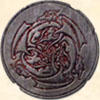Valley of Exiles
This valley is not so far into the Kun-Yen Shan that It is impossible to reach; difficult, perhaps, but not impossible. The entrance to the valley is guarded by a pair of stone forts that effectively block the northern, pass into the valley. Each fort is manned by 100 soldiers led by an 8th or 9th level samurai (q.v. Oriental Adventures), These guards are members of the Imperial Guard of Shou Lung, Their duty is first to see that no one leaves the valley, In addition, they discourage people from entering. Anyone who does enter is not allowed to leave unless he has presented a special pass from the Emperor of Shou Lung.
The reason for all these special precautions is obvious from the name of the place. The valley is one of many places where the Emperor of Shou Lung sends political prisoners. Those condemned to this valley are never allowed to leave. Within the valley, the inhabitants are allowed to live as they wish, but contact with the outside world is strictly forbidden.
To prevent any prisoners from escaping, the Mandarinate has set certain rules. The location of the valley is a closely guarded secret. No wizards or priests are exiled to the valley, instead being sent to special places suited to their powers. Likewise, only wizards and priests authorized by the emperor are allowed to enter the valley. All who attempt to enter the valley are challenged and searched (including detect magic and other spells).
Although the post is far from Shou Lung, the guards consider their assignment here a special honor. They are some of the most trusted of the Emperorís men. They serve for one year or less. During their service their loyalty is carefully monitored by the Imperial Censors. There is a chance the guards might mistake visitors for censors in disguise, if the characters have come from Shou Lung. At the end of their year of service, these soldiers are usually rewarded with prestigious posts elsewhere.
Currently in the valley are 20 prisoners. Of these, only three are important. The first is Su Po, a poet and scholar. Hardly a physical threat to the Emperor, Su Po is a member of the Society of the Purple Lotus, dedicated to the destruction of the Mandarinate. Arrested for writing persuasive arguments against the bureaucracy and the Emperor, Su Po was found guilty of crimes against the state. Since he is a distant relative of the Emperor, he was not executed, but sent into permanent exile instead. All his writings have been banned and ordered destroyed by the Emperor. As a result, Su Po has become a popular hero to the dissatisfied intellectuals of Shou Lung. Should he return, many of them would rally to his side, creating a significant threat to the Emperor.
The second man is General Chen. Twenty years ago he attempted to overthrow the Emperor and place himself on the throne. The coup almost led to a civil war between north and south Shou Lung. Chen was captured, but the Emperorís soothsayers advised against his execution. According to their spells, his spirit would return for revenge if the Emperor had him killed. Consequently, he has been exiled for life to this valley. Chen is an 18th level bushi.
Finally, there is Prince Sung. He has been imprisoned for attempting to elope with one of the Emperorís concubines. A favorite of the Emperor, Prince Sung was spared execution for his audacious act. He has been exiled for five years. However, since entering the valley he has heard many of the complaints (valid or not) against the Emperor and has secretly determined to overthrow the Master of the Jade Throne. While in the valley he has been diligently learning names of contacts and resources on the outside who might be useful to him.
The remaining prisoners are unfortunates who have incurred the wrath of the Emperor for one act or another. Many are innocent of any crime, but have been exiled through the manipulations of rivals. Others are embarrassments to the empire, removed from sight and hopefully forgotten. A few are old-timers, their existence and crimes long forgotten by the imperial court.
